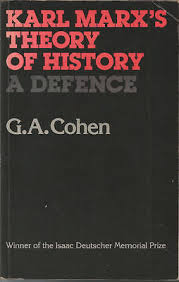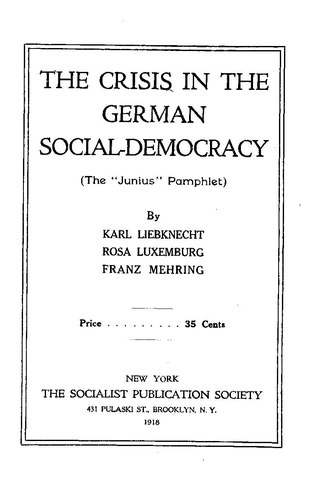Related Research Articles

Eduard Bernstein was a German Marxist theorist and politician. A prominent member of the Social Democratic Party of Germany (SPD), Bernstein has been both condemned and praised as a "revisionist" who challenged major aspects of Karl Marx's thought. A key influence on the European social democratic movement, Bernstein argued for legal legislation over revolutionary action, and a gradual democratization and socialization of capitalist society.

Karl Korsch was a German Marxist theoretician and political philosopher. He is recognized as one of the "dissidents" that challenged the Marxism of the Second International of Karl Kautsky, Georgi Plekhanov and Lenin. Along with György Lukács, Korsch is considered to be one of the major figures responsible for laying the groundwork for Western Marxism in the 1920s.

Alexander Theodore Callinicos is a Rhodesian-born British political theorist and activist. An adherent of Trotskyism, he is a member of the Central Committee of the Socialist Workers Party (SWP) and serves as its International Secretary. Between 2009 and 2020 he was the editor of International Socialism, the SWP's theoretical journal, and has published a number of books.
Raya Dunayevskaya, later Rae Spiegel, also known by the pseudonym Freddie Forest, was the American founder of the philosophy of Marxist humanism in the United States. At one time Leon Trotsky's secretary, she later split with him and ultimately founded the organization News and Letters Committees and was its leader until her death.

Marxism is a political philosophy and method of socioeconomic analysis. It uses a dialectical and materialist interpretation of historical development, better known as historical materialism, to analyse class relations, social conflict, and social transformation. Marxism originates with the works of 19th-century German philosophers Karl Marx and Friedrich Engels. Marxism has developed over time into various branches and schools of thought, and as a result, there is no single, definitive Marxist theory. Marxism has had a profound effect in shaping the modern world, with various left-wing and far-left political movements taking inspiration from it in varying local contexts.

Ágnes Heller was a Hungarian philosopher and lecturer. She was a core member of the Budapest School philosophical forum in the 1960s and later taught political theory for 25 years at the New School for Social Research in New York City. She lived, wrote and lectured in Budapest.

Michael Löwy is a French-Brazilian Marxist sociologist and philosopher. He is emeritus research director in social sciences at the CNRS and lectures at the École des hautes études en sciences sociales. Author of books on Karl Marx, Che Guevara, Liberation Theology, György Lukács, Walter Benjamin, José Carlos Mariátegui, Lucien Goldmann and Franz Kafka, he received the CNRS Silver Medal in 1994.

Ellen Meiksins Wood was an American-Canadian Marxist historian, and one of the primary developers of the Marxist tendency known as political Marxism.

Hegemony and Socialist Strategy: Towards a Radical Democratic Politics is a 1985 work of political theory in the post-Marxist tradition by Ernesto Laclau and Chantal Mouffe. Developing several sharp divergences from the tenets of canonical Marxist thought, the authors begin by tracing historically varied discursive constitutions of class, political identity, and social self-understanding, and then tie these to the contemporary importance of hegemony as a destabilized analytic which avoids the traps of various procedures Mouffe and Laclau feel constitute a foundational flaw in Marxist thought: essentializations of class identity, the use of a priori interpretative paradigms with respect to history and contextualization, the privileging of the base/superstructure binary above other explicative models.
Andrew Arato is a professor of Political and Social Theory in the Department of Sociology at The New School, best known for his influential book Civil Society and Political Theory, coauthored with Jean L. Cohen. He is also known for his work on critical theory and constitutions and was from 1994 to 2014 co-editor of the journal Constellations with Nancy Fraser and Nadia Urbinati.
Marxism is a method of socioeconomic analysis that originates in the works of 19th century German philosophers Karl Marx and Friedrich Engels. Marxism analyzes and critiques the development of class society and especially of capitalism as well as the role of class struggles in systemic, economic, social and political change. It frames capitalism through a paradigm of exploitation and analyzes class relations and social conflict using a materialist interpretation of historical development – materialist in the sense that the politics and ideas of an epoch are determined by the way in which material production is carried on.

Karl Marx's Theory of History: A Defence is a 1978 book by the philosopher G. A. Cohen, the culmination of his attempts to reformulate Karl Marx's doctrines of alienation, exploitation, and historical materialism. Cohen, who interprets Marxism as a scientific theory of history, applies the techniques of analytic philosophy to the elucidation and defence of Marx's materialist conception of history.
Paul Le Blanc is an American historian at La Roche University in Pittsburgh, as well as a labor and socialist activist. He has written and edited more than 30 books on topics such as Leon Trotsky and Rosa Luxemburg.
Revolutionary socialism is a political philosophy, doctrine, and tradition within socialism that stresses the idea that a social revolution is necessary to bring about structural changes in society. More specifically, it is the view that revolution is a necessary precondition for transitioning from a capitalist to a socialist mode of production. Revolution is not necessarily defined as a violent insurrection; it is defined as a seizure of political power by mass movements of the working class so that the state is directly controlled or abolished by the working class as opposed to the capitalist class and its interests.
In Marxist philosophy, the dictatorship of the proletariat is a condition in which the proletariat, or working class, holds control over state power. The dictatorship of the proletariat is the transitional phase from a capitalist to a communist economy, whereby the post-revolutionary state seizes the means of production, mandates the implementation of direct elections on behalf of and within the confines of the ruling proletarian state party, and institutes elected delegates into representative workers' councils that nationalise ownership of the means of production from private to collective ownership. During this phase, the organizational structure of the party is to be largely determined by the need for it to govern firmly and wield state power to prevent counterrevolution, and to facilitate the transition to a lasting communist society.

György Lukács was a Hungarian Marxist philosopher, literary historian, literary critic, and aesthetician. He was one of the founders of Western Marxism, an interpretive tradition that departed from the Soviet Marxist ideological orthodoxy. He developed the theory of reification, and contributed to Marxist theory with developments of Karl Marx's theory of class consciousness. He was also a philosopher of Leninism. He ideologically developed and organised Lenin's pragmatic revolutionary practices into the formal philosophy of vanguard-party revolution.
Orthodox Marxism is the body of Marxist thought which emerged after the deaths of Karl Marx and Friedrich Engels in the late 19th century, expressed in its primary form by Karl Kautsky. Kautsky's views of Marxism dominated the European Marxist movement for two decades, and orthodox Marxism was the official philosophy of the majority of the socialist movement as represented in the Second International until the First World War in 1914, whose outbreak caused Kautsky's influence to wane and brought to prominence the orthodoxy of Vladimir Lenin. Orthodox Marxism aimed to simplify, codify and systematize Marxist method and theory by clarifying perceived ambiguities and contradictions in classical Marxism. It overlaps significantly with Instrumental Marxism.

Karl Johann Kautsky was a Czech-Austrian philosopher, journalist, and Marxist theorist. A leading theorist of the Social Democratic Party of Germany (SPD) and the Second International, Kautsky advocated orthodox Marxism, which emphasized the scientific, materialist, and determinist character of Karl Marx's work. This interpretation dominated European Marxism for two decades, from the death of Friedrich Engels in 1895 to the outbreak of World War I in 1914.

The Junius Pamphlet was a text written by Rosa Luxemburg in 1915 while she was in prison, against the brutality of the First World War. The actual title of the work was The Crisis of German Social Democracy but she used the pen-name “Junius” to avoid prosecution, and this became the basis of the work's popular name. The name “Junius” was apparently a reference to Lucius Junius Brutus, a hero of the Roman Republic. The pseudonym also echoed a name used to sign political polemics against King George III of England, known as the Letters of Junius.
References
- ↑ "Jews and the Left"
- ↑ Norman Geras: 1943-2013, normblog
- ↑ Kovel, Joel (1991). History and Spirit: An Inquiry into the Philosophy of Liberation . Boston: Beacon Press. p. 255. ISBN 0-8070-2916-5.
- McLellan, David (1995). The Thought of Karl Marx: An Introduction. London: Papermac. p. 267. ISBN 0-333-63948-0.
- Eagleton, Terry (2012). Why Marx Was Right . New Haven: Yale University Press. p. 80. ISBN 978-0-300-18153-1. - ↑ Ben Cohen "Norman Geras: 1943-2013", The Tablet, 18 October 2013
- ↑ "Norman Geras on Twitter: "On the normblog tweets calendar it's now 1962. I have just arrived in England, a fresh-faced lad from Bulawayo."". Twitter.com. 2 August 2010. Retrieved 7 October 2016.
- ↑ Geras, Norman (2 August 2010). "Jeez, my life is rushing by. It's 1966 turning into 1967. In August of the latter year Adele and I got married and we came to Manchester". Twitter. Retrieved 7 October 2016.
- ↑ Haroon Siddique, "Pioneering blogger Norman Geras dies of prostate cancer aged 70", The Guardian, 18 October 2013
- ↑ "Professor Norman Geras". The Times. London. 29 October 2013. Retrieved 16 August 2016.(subscription required)
- ↑ "normblog: About". Normblog.typepad.com. 23 June 2012. Retrieved 7 October 2016.
- ↑ "normblog". Normblog.typepad.com. Retrieved 7 October 2016.
- ↑ Geras, Norman (1989). "Our Morals: The Ethics of Revolution". Socialist Register. 25. Retrieved 13 November 2018.
- Geras, N.; Miliband, R. Panitch; Saville, J. L. (1989). "Our Morals: The Ethics of Revolution". Revolution Today: Socialist Register 1989. Retrieved 11 November 2018. - ↑ Courea, Eleni (11 November 2018). "University alerts students to danger of leftwing essay". The Observer. Retrieved 11 November 2018.